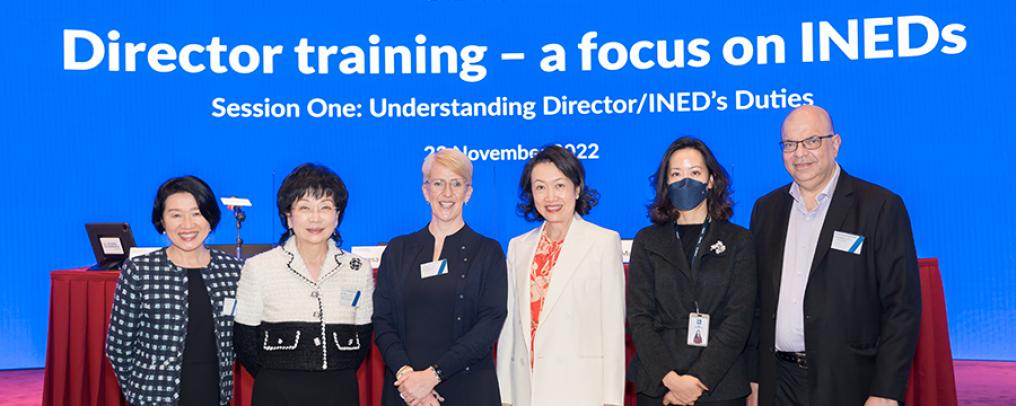One of the things that Covid-19 demonstrated was that having an effective board is an essential prerequisite for surviving a major crisis. With no shortage of those on the
horizon, organisations able to build and maintain boards with diverse talents, skills and perspectives will be better positioned to survive and thrive in the years ahead.
This edition of your journal is all about board effectiveness. Our cover story this month looks at a relatively neglected aspect of this issue – succession planning. Like many aspects of corporate governance, there is more to this issue than meets the eye.
The common assumption seems to be that succession planning is primarily a practical matter, but our cover story emphasises that this is not just about being ready to replace directors when their terms expire. Done well, it is more about developing an understanding of the present and future challenges the organisation needs to address, and the sorts of skills and personal characteristics the organisation’s directors will need to successfully navigate those challenges.
Put simply, while board renewal can be a practical challenge, particularly when a director’s departure is unexpected, it is also an opportunity. A sound longterm strategy for board succession will be constantly addressing the gaps in board expertise, planning for the future and seeking to improve the board’s diversity profile. Long-term strategy is, after all, where a good board adds value. While management needs to focus on day-to-day operations, directors need to focus on the medium- and long-term risks and opportunities of the changing operating environment.
I hardly need to add that this task will continue to be complex and critical to the survival of organisations in the medium and long term. There is no quick fix to the multitude of new risks that boards have to address – from cybersecurity and data privacy to ESG performance and reporting – so directors, more than ever, need to have an understanding of the big picture.
This month’s first In Focus article shares insights on this related aspect of board effectiveness. As I mentioned in my message last month, our Institute has launched a new series of training sessions, in collaboration with Hong Kong Exchanges and Clearing Ltd, to broaden awareness and understanding of directors’ duties, especially those of independent non-executive directors (INEDs). The In Focus article highlights the key takeaways from the first session of this series.
Regulators are stepping up their enforcement in respect of breaches of directors’ duties and the first training session set out to explain the current and impending regulatory expectations relating to those duties. It also addressed related issues such as the board’s collective responsibility, board independence, the roles and liabilities of INEDs, board diversity, and the importance of board oversight of ESG and sustainability matters.
If you haven’t already done so, I recommend you sign up for the third and final session in this training series to be held on 17 March. Moreover, look out for future training series on this and related themes. Rest assured, our Institute will continue to play a role, both via its thought leadership publications and CPD training, in supporting board effectiveness.
horizon, organisations able to build and maintain boards with diverse talents, skills and perspectives will be better positioned to survive and thrive in the years ahead.
This edition of your journal is all about board effectiveness. Our cover story this month looks at a relatively neglected aspect of this issue – succession planning. Like many aspects of corporate governance, there is more to this issue than meets the eye.
The common assumption seems to be that succession planning is primarily a practical matter, but our cover story emphasises that this is not just about being ready to replace directors when their terms expire. Done well, it is more about developing an understanding of the present and future challenges the organisation needs to address, and the sorts of skills and personal characteristics the organisation’s directors will need to successfully navigate those challenges.
Put simply, while board renewal can be a practical challenge, particularly when a director’s departure is unexpected, it is also an opportunity. A sound longterm strategy for board succession will be constantly addressing the gaps in board expertise, planning for the future and seeking to improve the board’s diversity profile. Long-term strategy is, after all, where a good board adds value. While management needs to focus on day-to-day operations, directors need to focus on the medium- and long-term risks and opportunities of the changing operating environment.
I hardly need to add that this task will continue to be complex and critical to the survival of organisations in the medium and long term. There is no quick fix to the multitude of new risks that boards have to address – from cybersecurity and data privacy to ESG performance and reporting – so directors, more than ever, need to have an understanding of the big picture.
This month’s first In Focus article shares insights on this related aspect of board effectiveness. As I mentioned in my message last month, our Institute has launched a new series of training sessions, in collaboration with Hong Kong Exchanges and Clearing Ltd, to broaden awareness and understanding of directors’ duties, especially those of independent non-executive directors (INEDs). The In Focus article highlights the key takeaways from the first session of this series.
Regulators are stepping up their enforcement in respect of breaches of directors’ duties and the first training session set out to explain the current and impending regulatory expectations relating to those duties. It also addressed related issues such as the board’s collective responsibility, board independence, the roles and liabilities of INEDs, board diversity, and the importance of board oversight of ESG and sustainability matters.
If you haven’t already done so, I recommend you sign up for the third and final session in this training series to be held on 17 March. Moreover, look out for future training series on this and related themes. Rest assured, our Institute will continue to play a role, both via its thought leadership publications and CPD training, in supporting board effectiveness.



